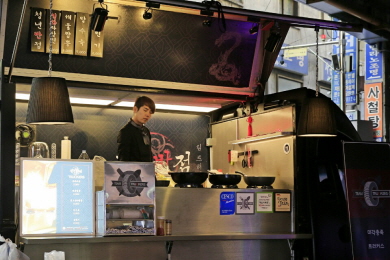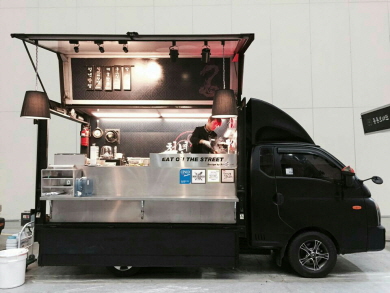
Despite the successive amendments to the law to legalize and vitalize the food truck industry, there have been constant complaints regarding the strict restrictions that cut the business value of food trucks. As the protests go on, some local governments have decided to enact ordinances to lessen the limitations and encourage more young entrepreneurs to start their own food truck business.
The legalization of food trucks was realized in late 2014 as one of the government’s attempts to solve the unemployment crisis, expecting it to be an approachable start-up item for young people. However, more than a year after the establishment of food truck, the heavy restrictions on areas and mobility are discouraging youths from running them.
According to the Implementing Regulations in Food Sanitation Law, food trucks are currently allowed to operate in eight designated areas, including parks, river banks, tourist attractions, university campuses, and areas or facilities permitted by ordinances. Since the number of the authorized areas is small and they have less floating population than urban areas do, many food truck owners argue that making a profit is difficult.
“There are fewer than 10 designated spots in Seoul where running a food truck is allowed, which is far too small to accommodate the increasing number of food trucks in business,” said Jeong Ju-ram, the owner of the food truck Cheongnyunbanjum. “I’m currently closed because I could not find a spot even though I visited each and every local government in Seoul. I’m usually closed for a good two-thirds of a month.”

In addition to the small number of legally permitted areas, lack of ordinances is also a problem.
“The administration of food trucks falls under the jurisdiction of local governments,” said an officer of the Seoul Metropolitan Government (SMG) who wished to remain anonymous. “Therefore, whether or not to establish ordinances expanding the authorized business area for food trucks and offering them legal support depends on the local governments.”
Another restriction that food truck owners pointed out as a problem is the prohibition of movement. By banning the food trucks from moving, the current law is divesting the industry of its merit. Food truck owners are forced to stay in one area, which is usually a place with small population, in other words a place with low demand. The aforementioned problems resulted in merely 93 food trucks legitimately operating all over the country; meanwhile, many owners are either running illegal food trucks or closing down their businesses.
“Most food trucks you see on the streets are illegal,” Jeong revealed. “For now, actually running a food truck is next to impossible. If nothing changes in a few months, I’m going out of business as well.”
To tackle this problem, SMG is in the process of enacting ordinances. The plan includes expanding business areas and adopting an application system for designating business areas.
“The main point of the ordinance is to expand the business areas by adding five more types of location, such as cultural facilities, festivals run by public institutions, and pedestrian walkways,” the officer said. “The SMG is searching for areas that enable food truck owners to make enough profit and avoid conflicts with the existing restaurants at the same time, because the areas were severely limited in the first place for that very reason.”
Aside from searching for appropriate areas, SMG is also considering limiting sales items to avoid conflicts with the local businesses and setting a two-year time limit to provide as many youths as possible with an opportunity to run a food truck.
Regarding the new announcements and policies of the SMG, Jeong is both skeptical and hopeful.
“I think it is great that at least something is getting better,” Jeong said. “Perhaps they are now realizing that simply legalizing food trucks does not automatically lead to the start of a food truck industry and are taking follow-up measures.”
However, even though some local governments are suggesting stimulus plans in an effort to support the food truck industry, many other city governments are yet to establish ordinances regarding food trucks. For example, in cities such as Suwon, no food trucks are operating due to lack of legislation that allows their businesses and lack of guidance.
“Currently, the food truck business is nowhere near being a solution for youths who are struggling to get a job,” Jeong added. “The food truck business can only be a solution when the unreasonable restrictions are eased and the whole industry becomes systematized so that a single food truck can offer jobs to people.”
For the food truck business to become a practical solution to today’s unemployment crisis, constant and substantial support regarding legal regulations is required from local governments.

